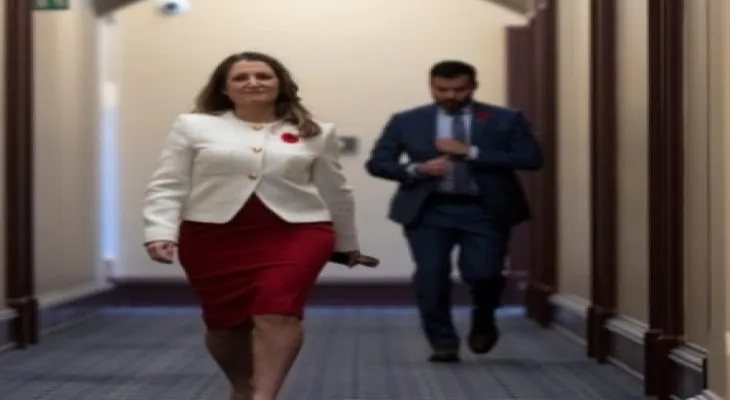Search here
Newspaper
Search here

Arab Canada News
News

Published: November 3, 2022
Finance Minister Chrystia Freeland delivered her fall economic statement today, Thursday, as the economy stands on the brink of recession. While Freeland promised fiscal caution in an era of extremely high inflation, the budget proposes billions of dollars in new spending to help some people severely affected by rising prices – including students and low-income workers – and to launch what she described as a "real and strong industrial policy" to position Canada for economic growth. Freeland told the House of Commons today that the improvement in the federal financial picture "did not happen by accident," adding: "It happened because people endured COVID, kept their businesses running, continued working and operating, and that is why Canada is in this very great position where it significantly outperformed our expectations in the April budget."
Freeland’s spring budget had also forecast a deficit of $52.8 billion for the 2022-23 fiscal year. Now, the fall economic statement expects a deficit of $36.4 billion. This is still much higher than the $23 billion deficit Ottawa could have recorded if it had saved more of its unexpected financial gains instead of allocating them to new programs. When asked whether it was appropriate to spend some newly discovered revenues with the economy in an unstable state, Freeland said the government "chose to invest that increase." Also, Freeland stated that the government is working to achieve two goals: it wants to avoid fueling inflation while supporting those heavily affected by the rising cost of living.
Additionally, the government fears the economy may slip into recession next year as sharp interest rate hikes by the Bank of Canada significantly slow the previously hot economy. Private sector economists surveyed by Ottawa expect real GDP growth just above zero over the next several quarters. This would raise Canada’s unemployment rate from the current 5.2 percent to 6.3 percent by the end of next year. Furthermore, the federal government presented what it called a "downside scenario" for growth and employment – a scenario in which recession leads to the loss of thousands of jobs, lower tax revenues, increased Employment Insurance (EI) payments, higher debt servicing costs, and a significantly higher deficit: $49.1 billion in 2022-23.
In the same context, the government said this "downside scenario" is not out of the question. In fact, Freeland’s department said on Thursday that "the balance of risks to the growth outlook tilts downward." Adding in a speech given today: "This is a tough time for millions and it is important for me to be honest with Canadians about the challenges ahead. Interest rates are rising with central bank intervention to address inflation. This means our economy is slowing down."
Comments